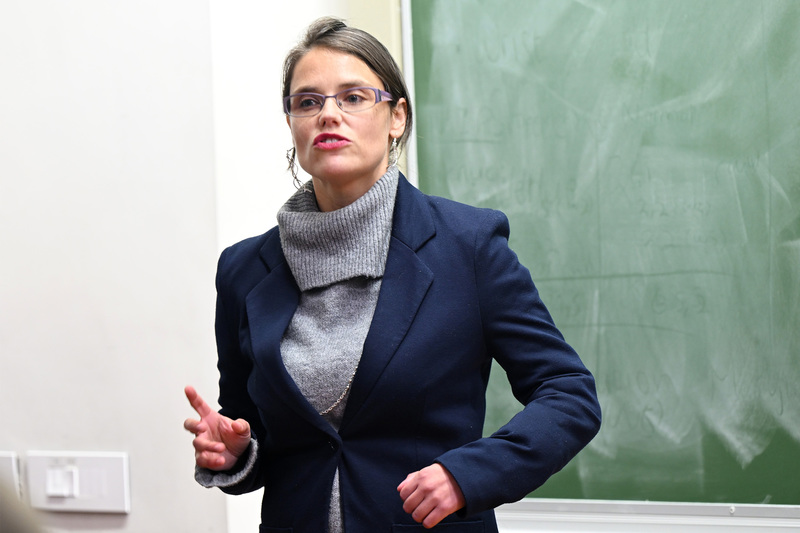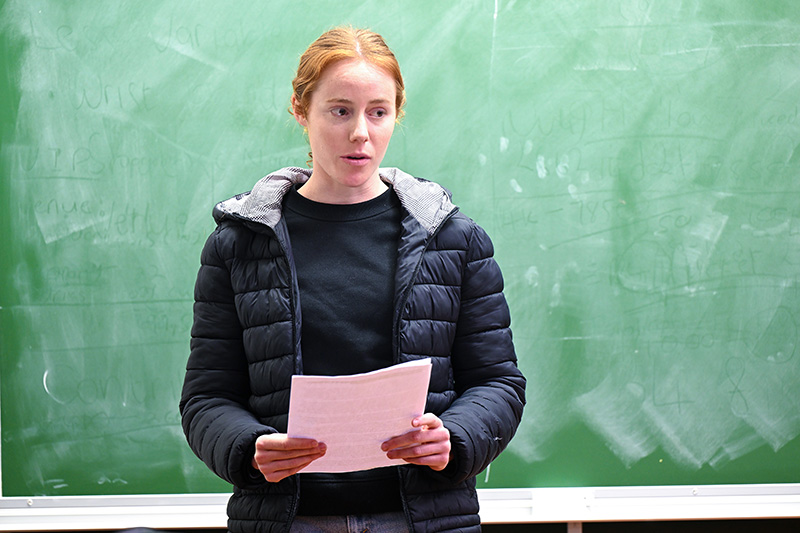A heartbeat of hope: stories of grit and glory
08 August 2025 | Story Myolisi Gophe. Photos Lerato Maduna. Read time 8 min.
Michelle Luscombe ended her talk the way she started it: asking the audience to feel their pulse. “Can you feel it? That’s proof you are alive. Most people say life is too short, but I think life is long.”
Luscombe knows what she’s talking about. On the day of her presentation, she had been 13 years and eight months pain-free after enduring a series of life-threatening health challenges that had nearly ended her dreams. Instead, they became the foundation for her to become a transplant athlete, motivational speaker, and a national representative at global events.
On 4 August, she was one of the three “dynamic and inspirational women”, alongside University of Cape Town (UCT) student and triathlon star Rebecca Monk and long-distance Olympian Cian Oldknow, to share their amazing stories at the ninth annual Women in Sport talk. Hosted by the UCT ParaSport Club in keeping with the Women’s Month tradition, the hybrid event served as a necessary motivation for student athletes and staff alike to pursue their dreams despite life’s challenges.
The Graaf Reinet-born Luscombe was a farm girl who loved sports days more than anything. But shortly after finishing a 1500 m race in 2001, her life shifted in an instant when she collapsed. Within minutes, she was strapped to life support, racing 400 km across the Karoo to reach a rescue jet waiting at the nearest airport to take her to Red Cross War Memorial Children’s Hospital.
“Just because someone tells you it can’t be done doesn’t mean it can’t.”
She was diagnosed with a rare heart condition: arrhythmogenic right ventricular cardiomyopathy. Her heart would beat too fast, erratically, then stop altogether. Doctors implanted anan implantable cardioverter defibrillator (ICD)which monitored her heart and would deliver an electric shock to restart it when needed.
At 12, she was instructed not to drive, travel alone, or chase the dreams she once had. But Luscombe refused to accept that her life was over. “Just because someone tells you it can’t be done doesn’t mean it can’t.”
At 16, tragedy struck again. She suffered a major stroke that left her completely paralysed. Alone in her hospital bed, she closed her eyes and imagined her legs moving until the slow movement returned.
Her left arm never regained function, but she adapted and taught herself to write, eat, and live with one hand. She returned to high school with limited mobility and an unpredictable heart that could drop her at any moment. Through all of this, Luscombe held on to life with determination.
Years later, she was diagnosed with end-stage heart failure. The only option left was a transplant, a gift that gave her a second chance.

Slowly, she began to run again and entered her first international race. Her childhood dreams of being an athlete were no longer a fantasy but a reality. Since then, she has won several medals for the country, and next week she is scheduled to participate in the World Transplant Games in Germany.
“Life isn’t short. It’s long. It changes. It challenges. But it also surprises you – if you let it.”
When she invited the audience to feel their pulse, she was reminding them that being alive is a gift. And with the right mindset, it’s a gift that keeps giving. “Pain changes your life. It shrinks your world. It takes away your energy, your dreams, your hope. I thought it would never end.” But then something shifted. “I started small. I learned to listen to my body. To track the good days and forgive the ones that weren’t.
“I stopped chasing the version of myself I had lost. And instead, I started building a new one. You learn to notice the little things. You learn that survival is a kind of triumph. So yes, life is long. Long enough to hurt. Long enough to heal. Long enough to change again and again.”
Chasing dreams one step at a time
Oldknow’s path from school fun runs to the Olympic Games is inspirational. “I won a fun run in Grade 3, and that was it – I was hooked. I loved the feeling of winning. I loved that feeling of running and I was like, wow, I love this, and I’m going to keep doing it,” she said, joining the proceedings online. By Grade 5, she was racing at a national level.
“There are barriers for women in running. I want to help girls chase their dreams. Everyone has dreams – we just need to go for it.”
But her teenage years brought challenges: a dip in performance, her stepfather’s death, and depression. “I was doing what I could, where I could.”
In university, she focused on sports psychology. “Mental health is everything. You can’t perform if you’re not in a good headspace.” And a shoulder surgery setback couldn’t stop her. In 2017, she returned stronger. “I had unfinished business. I gave every race my best.”
In 2022, Oldknow competed in Mauritius for the senior national team. But disaster struck again. “I dislocated my shoulder 100 m in. I spent 40 seconds trying to get it back in, but I finished the race.”
Another surgery followed. In 2023, she competed at the World Cross Country Championships and ran her Olympic-qualifying marathon. Then another hurdle: a concussion and hip injury just 16 weeks before the Olympics. “I couldn’t run for five weeks. But I trained in the pool and on the bike. When I ran again, I just ticked off the weeks.”
She made it to Paris. “At 10 km, I heard my family cheering and thought, ‘I’m having fun.’ That joy carried me to the end.” Now, she wants to give back. “There are barriers for women in running. I want to help girls chase their dreams. Everyone has dreams – we just need to go for it.”
Finding a home in triathlon
For Monk, who is pursuing her academic career in geology and oceanography at UCT, family has played a critical role in her remarkable career, from introducing her to sports to supporting her in her success. “As a 13-year-old, I was a swimmer who had recently started running. Occasionally, we went cycling alongside our parents. My uncle suggested that I try triathlons. He said he’d enter if I did. I entered. He didn’t. But I did the race and thought, ‘That was the hardest thing I’ve ever done!’ Unknowingly, that day set my biggest life goal.”
In high school, she grew more competitive, but COVID-19 interrupted her progress. “But I stayed motivated. I entered a rainy post-lockdown triathlon. I was terrified, but excited.”
Monk found her tribe in the Atlantic Triathlon Club. By matric, she was placing in the top three. She joined RUSH Athletics and started competing in duathlons, eventually qualifying for World Champs in Ibiza, Spain. This year, she represented South Africa at the 2025 World Triathlon Multisport Championships in Pontevedra, Spain. “It’s been an amazing journey,” she said.
Still, something felt missing. “My sister and I have a special bond. She hates running but loves swimming. She inspired me to join UCT Swimming.” But her biggest supporter is her dad. “He’s the one waking up at 05:00, running in the dark, cold and rain with me. He listens to every race story. We did our first Ironman 70.3 together. I’m extremely grateful for this. It has been really special to share my triumphant journey with him.”
 This work is licensed under a Creative Commons Attribution-NoDerivatives 4.0 International License.
This work is licensed under a Creative Commons Attribution-NoDerivatives 4.0 International License.
Please view the republishing articles page for more information.










